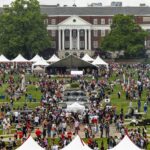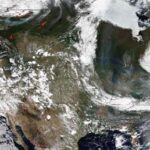After weeks of hot summer weather, the early days of fall historically promise a cool breeze and a decrease in temperature. Most U.S. regions however, will experience one if not several brief resurgences of either summer-like or above average temperatures, following the September Equinox. The word “Indian Summer” is often loosely applied to any generic period of warmer temperatures during the months of autumn, but often outside of the true or intended historical definition of the term.
ESSIC Senior Research Scientist and Deputy Director Phil Arkin, former author of the Center’s “Climate Today” blog, explained the most significant and often overlooked criteria for a true “Indian Summer” event, as described by the National Weather Service.
“It’s a period of warm weather that follows weather cold enough to stop the growing season,” said Arkin.
Arkin mentioned the most likely time of year for a true “Indian Summer” varies upon geographical location, but that in the DC-region, the likelihood of experiencing one before mid-fall would be small, given our typical first frost or freeze.
“A [first] frost or freeze typically occurs around here [D.C. area] in November,” said Arkin.
Although the area has certainly experienced some temperature fluctuations thus far this fall, Arkin stated that by definition, the Washington D.C region has certainly not experienced an “Indian Summer” as yet.
Arkin went on to state that periods of warmth during autumn or even during the winter months, are not uncommon.
Arkin noted another coined weather term “January Thaw,” which historically defines a return of moderating conditions and snow melt to regions having already experienced weeks of freezing temperatures and winter precipitation.
When asked what effects climate change and global warming might have on these historical weather references, Arkin noted a potential increase in both fall and winter warm-ups.
“Global warming does affect these kinds of things [and as a result] they’ll be a little more common,” Arkin said.






